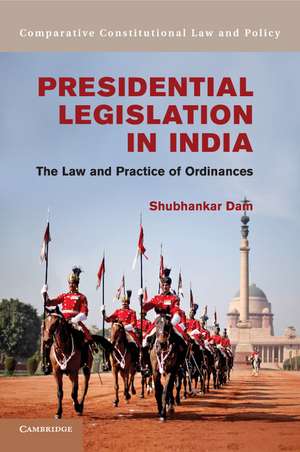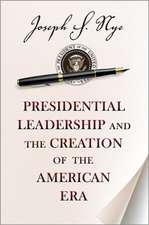Presidential Legislation in India: The Law and Practice of Ordinances: Comparative Constitutional Law and Policy
Autor Shubhankar Damen Limba Engleză Paperback – 29 iul 2015
| Toate formatele și edițiile | Preț | Express |
|---|---|---|
| Paperback (1) | 284.56 lei 6-8 săpt. | |
| Cambridge University Press – 29 iul 2015 | 284.56 lei 6-8 săpt. | |
| Hardback (1) | 723.92 lei 6-8 săpt. | |
| Cambridge University Press – 15 dec 2013 | 723.92 lei 6-8 săpt. |
Din seria Comparative Constitutional Law and Policy
-
 Preț: 439.01 lei
Preț: 439.01 lei -
 Preț: 293.64 lei
Preț: 293.64 lei -
 Preț: 367.67 lei
Preț: 367.67 lei - 14%
 Preț: 739.13 lei
Preț: 739.13 lei -
 Preț: 280.48 lei
Preț: 280.48 lei -
 Preț: 206.84 lei
Preț: 206.84 lei -
 Preț: 236.43 lei
Preț: 236.43 lei -
 Preț: 178.97 lei
Preț: 178.97 lei -
 Preț: 177.71 lei
Preț: 177.71 lei - 9%
 Preț: 660.82 lei
Preț: 660.82 lei - 9%
 Preț: 696.09 lei
Preț: 696.09 lei -
 Preț: 289.73 lei
Preț: 289.73 lei -
 Preț: 238.36 lei
Preț: 238.36 lei -
 Preț: 201.18 lei
Preț: 201.18 lei -
 Preț: 238.11 lei
Preț: 238.11 lei - 9%
 Preț: 695.78 lei
Preț: 695.78 lei -
 Preț: 319.99 lei
Preț: 319.99 lei -
 Preț: 248.39 lei
Preț: 248.39 lei -
 Preț: 358.66 lei
Preț: 358.66 lei -
 Preț: 283.03 lei
Preț: 283.03 lei -
 Preț: 358.48 lei
Preț: 358.48 lei - 14%
 Preț: 742.60 lei
Preț: 742.60 lei - 14%
 Preț: 727.91 lei
Preț: 727.91 lei - 23%
 Preț: 635.44 lei
Preț: 635.44 lei - 14%
 Preț: 721.78 lei
Preț: 721.78 lei -
 Preț: 283.25 lei
Preț: 283.25 lei -
 Preț: 267.18 lei
Preț: 267.18 lei -
 Preț: 321.31 lei
Preț: 321.31 lei -
 Preț: 385.61 lei
Preț: 385.61 lei -
 Preț: 286.89 lei
Preț: 286.89 lei -
 Preț: 356.75 lei
Preț: 356.75 lei - 23%
 Preț: 701.70 lei
Preț: 701.70 lei - 14%
 Preț: 723.27 lei
Preț: 723.27 lei -
 Preț: 322.29 lei
Preț: 322.29 lei -
 Preț: 358.48 lei
Preț: 358.48 lei
Preț: 284.56 lei
Nou
Puncte Express: 427
Preț estimativ în valută:
54.46€ • 56.53$ • 45.41£
54.46€ • 56.53$ • 45.41£
Carte tipărită la comandă
Livrare economică 22 martie-05 aprilie
Preluare comenzi: 021 569.72.76
Specificații
ISBN-13: 9781107546028
ISBN-10: 1107546028
Pagini: 278
Ilustrații: 21 tables
Dimensiuni: 152 x 229 x 15 mm
Greutate: 0.38 kg
Editura: Cambridge University Press
Colecția Cambridge University Press
Seria Comparative Constitutional Law and Policy
Locul publicării:New York, United States
ISBN-10: 1107546028
Pagini: 278
Ilustrații: 21 tables
Dimensiuni: 152 x 229 x 15 mm
Greutate: 0.38 kg
Editura: Cambridge University Press
Colecția Cambridge University Press
Seria Comparative Constitutional Law and Policy
Locul publicării:New York, United States
Cuprins
Part I. Origins and Practice: 1. The transplant effect: early origins of ordinances in England and India; 2. Surrogate legislation: an empirical account of ordinances, 1952–2009; Part II. Law and Interpretation: 3. Negotiating the text: ordinances, Article 123, and the interpretative deficit; 4. Reading minds: presidential satisfaction and judicial review of ordinances; 5. The power of no: presidents, cabinets, and the making of ordinances.
Recenzii
'Dam is among the rising stars in the jurisprudential study of Indian law. The analysis in this important book demonstrates how India's executive has repeatedly enacted economic and social policies by bypassing parliament, and the institutional perils of doing this. Relevant to understanding the current economic situation brought about by executive action, the book must be read by all policymakers and scholars interested in India.' Jagdish Bhagwati, University Professor of Economics, Law and International Affairs, Columbia University
'This book is essential reading for anyone interested in constitutionalism, the rule of law and Indian democracy. It lays out a detailed analysis of the ordinance-making power of the Indian President and a vigorous argument for a reappraisal of its interpretation and use. Challenging the apparent clarity of the constitutional text, and invoking deeper arguments of constitutional principle, it bravely rejects the widespread assumption that legislation and ordinances are equivalent and highlights the exceptional and deeply problematic nature of the President's power to enact legislation.' Simon Evans, University of Melbourne
'This book is essential reading for anyone interested in constitutionalism, the rule of law and Indian democracy. It lays out a detailed analysis of the ordinance-making power of the Indian President and a vigorous argument for a reappraisal of its interpretation and use. Challenging the apparent clarity of the constitutional text, and invoking deeper arguments of constitutional principle, it bravely rejects the widespread assumption that legislation and ordinances are equivalent and highlights the exceptional and deeply problematic nature of the President's power to enact legislation.' Simon Evans, University of Melbourne
Notă biografică
Descriere
This book is a study of the president of India's authority to enact legislation (or ordinances) at the national level without involving parliament.









